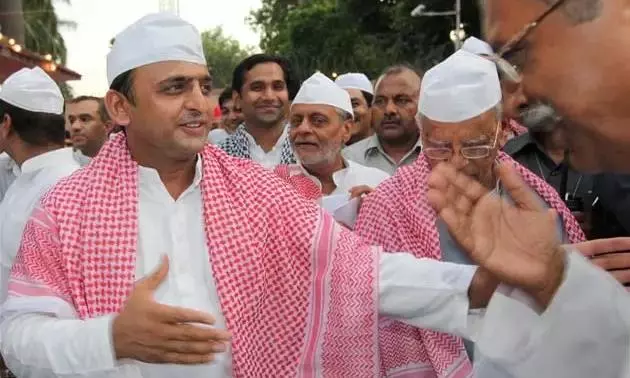
Cong, SP drop Muslim candidates for ‘Upper Caste’ Hindus in UP
text_fieldsIn the lead-up to the 2024 Lok Sabha elections in India, the western region of Uttar Pradesh is experiencing significant shifts in its political landscape, marked by intricate caste dynamics, strategic candidate selections, and alliance formations as parties brace for a fiercely contested battle.
The INDIA bloc has put forth a compelling narrative centred around greater representation of backward castes, Dalits, and Muslims. According to The Wire, a complex picture in West UP, where traditional caste equations intersect with evolving electoral strategies.
In a region marked by its socio-cultural diversity, encompassing the sugarcane-rich Jat belts, prosperous Braj region, thriving National Capital Region, and pockets of dense Muslim population in Rohilkhand, political dynamics are deeply intertwined with caste affiliations and historical contexts.
The main Opposition alliance, comprising the Congress and the Samajwadi Party (SP), has recalibrated its ticket distribution strategy, reducing the share of Muslim and Other Backward Class (OBC) candidates while increasing the number of tickets for Hindu "upper castes" and Dalits, The Wire report says.
This move reflects a calculated attempt to appeal to a broader spectrum of voters, especially in the backdrop of the BJP's dominant electoral performance since 2014, buoyed by communal sentiments and polarization.
The SP, under the leadership of Akhilesh Yadav, is rallying under the banner of PDA - Pichda, Dalit, Alpsankhyak - signalling a concerted effort to mobilize OBCs, Dalits, and Muslims while marginalizing the "upper castes," perceived as more aligned with the BJP.
However, this strategic realignment has not been without its challenges and controversies. In constituencies like Moradabad and Meerut, where Muslim candidates have historically held sway, the SP's decision to field candidates from non-Muslim backgrounds has stirred discontent among sections of the Muslim community.
Furthermore, the emergence of the National Democratic Alliance (NDA), bolstered by the inclusion of the Rashtriya Lok Dal (RLD), led by Chaudhary Jayant Singh, has necessitated a recalibration of caste arithmetic within the Opposition alliance. The RLD's influence among Jats has prompted the Opposition to pivot towards garnering support from other non-dominant OBC communities.
The BSP, led by Mayawati, emerges as a potential wildcard, with strategic candidate selections aimed at maximizing its impact on key battlegrounds. With Mayawati fielding Muslim candidates in several crucial constituencies, the BSP could prove to be a formidable spoiler for the Opposition alliance, complicating their electoral prospects.
Meanwhile, dissent within certain caste groups, notably the Rajputs, threatens to unsettle established electoral equations. The simmering rivalry between Rajputs and Gurjars over historical legacies and perceived neglect by the ruling BJP government has led to expressions of discontent and threats of retribution, potentially influencing electoral outcomes in constituencies such as Ghaziabad, Gautam Buddha Nagar, and Kairana.
The BJP's electoral strategy, rooted in the consolidation of non-Yadav OBCs and "upper castes," remains steadfast. With a candidate lineup predominantly comprising non-Yadav OBCs and "upper castes," the BJP aims to leverage its majoritarian Hindutva politics to maintain its electoral dominance in the region.
However, dissent from marginalized caste groups, such as the Saini, Tyagi, and Rajput communities, threatens to disrupt the party's electoral calculus.
The simmering rivalry between Rajputs and Gurjars over historical legacies and perceived political marginalization adds another layer of complexity to the electoral landscape. Rajput groups, feeling underrepresented in ticket distribution, have vowed to support candidates best placed to defeat the BJP, potentially complicating matters for the ruling party in key constituencies like Ghaziabad, Gautam Buddha Nagar, and Kairana.























